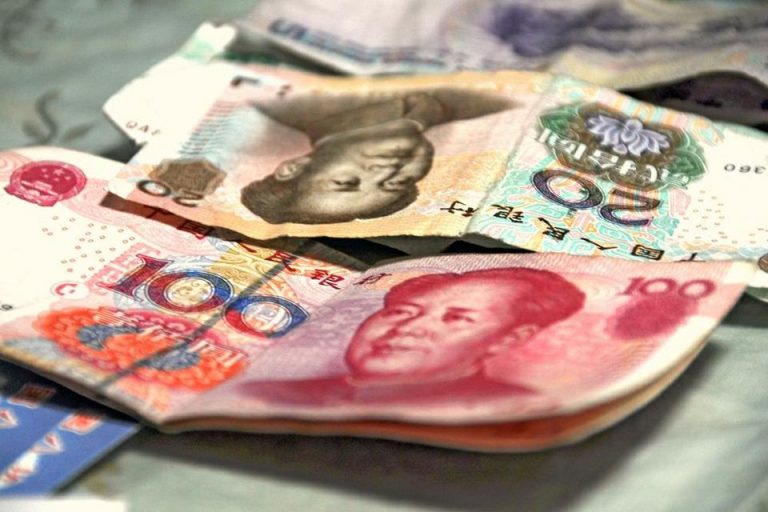Since the second half of 2016, the Chinese government has been placing stricter controls on the country’s massive reserves of foreign currency as the economy suffers setbacks.
Members of the Chinese middle class have found it increasingly difficult to access foreign currency or remit money internationally, while Beijing’s decision to clamp down on foreign exchanges stands to harm the country’s credit and economic vitality.
According to a February report by the International Finance Association based in Washington, just US$60 billion left China in 2017, a fraction of the US$640 billion in outflows during 2016.
As of this June, people in China can only withdraw US$5,000 worth of foreign money daily, and starting in October, all trades worth US$10,000 or more are required to be tracked by the government for “anti-terrorism” purposes.
The foreign exchange card
According to prominent Chinese economist He Qinglian, who resides in the United States, Beijing holds its foreign reserves especially dear, with the Sino-U.S. trade war putting pressure on China’s communist authorities to keep the economy stable.
Success
You are now signed up for our newsletter
Success
Check your email to complete sign up
“As long as China maintains its current foreign exchange management system, this card has a great effect on stabilizing its currency and economy. In 1998, this system protected China from the impact of the Southeast Asian financial crisis caused by George Soros. In the next two years, this will also become China’s last line of defense against Washington’s trade offensive,” she wrote in an article translated and published by The Epoch Times.
He Qinglian noted that Yi Gang, governor of the People’s Bank of China (PBoC), said at the G30 International Banking Seminar in 2018 on Oct. 14: “We still have considerable monetary policy tools, including interest rates, required reserve ratio, monetary conditions, and other means at our disposal. The above tools are sufficient to deal with uncertainty.”
However, China’s foreign reserves peaked at about US$4 trillion in 2014, and have dipped to less than US$3 trillion in 2017.

China’s foreign reserves peaked at about US$4 trillion in 2014, and have dipped to less than US$3 trillion in 2017. (Image: Graphicstock)
According to a report by Radio Free Asia (RFA), China still owns the most foreign exchanges of any country in the world, but it is especially vulnerable to a decline due to the characteristics of its economic system, which is dominated by state-run-enterprises that give the Chinese Communist Party (CCP) more control over society at the expense of profitability, innovation, and competitiveness.
“Foreign exchange reserves are seen in China as a financial buffer for turbulent times,” the report says.
RFA cited Chinese economist Cheng Xiaonong as saying, in comments translated by China Change, that “part of China’s economic security is the demand for foreign imports. If China loses the reserves it needs to import goods, oil and food prices will present a massive dilemma. Therefore, retention of these three trillions is something the Chinese government keeps a close watch on.”
Political uncertainties
The CCP’s policies have affected even very large Chinese companies, such as the film distributor Wanda, and Anbang, a prominent Chinese financial firm. RFA reported that in 2017, the two companies were forced by the Chinese Banking Regulatory Commission to sell overseas assets and transfer the funds back to China. In the first half of 2017, direct investment to China fell by 40 percent.
The uncertainties of China’s authoritarian political system have motivated many wealthy Chinese to move their assets and family members overseas, and many young talents have gone abroad to find employment, where they hope to find fewer obstacles to their careers.
Speaking to RFA, former finance journalist Ye Zhao said: “Once a family makes a few million, it first sends its children abroad; if they make tens of millions, the whole family will emigrate. The ones with hundreds of millions will set up business overseas. Families that own billions are necessarily entangled with politics and the environment is too difficult for them to do business in.”
The Chinese economy has been in a downward spiral since 2011, with domestic consumption falling. Private companies are squeezed by high taxes and fees, and due to the CCP’s “supply-side reform” policies, they are often strong-armed into merging with state-owned enterprises to keep them from bankruptcy.

The Chinese economy has been in a downward spiral since 2011, with domestic consumption falling. (Image: flickr; CC0 2.0)
At the same time, the United States has imposed tariffs on hundreds of billions of dollars worth of Chinese imports, citing Beijing’s failure to follow standard trade practices and its widespread intellectual property theft.
This phenomenon is related to a dilemma inherent to the Chinese government’s foreign exchange controls, said He Jiangbing, a Chinese financial scholar.
Using the “impossible trinity” theory of international economics, He told RFA that China’s insistence on maintaining a fixed foreign exchange rate and an independent monetary policy has disrupted the free flow of capital, putting a huge burden on the Chinese middle class and private business.
A Chinese woman surnamed Zhang, who resides in the United States, told RFA that because of the government’s limits on foreign exchanges, she was stranded in China after returning to Beijing to sell her house this October.
“I’m still stuck here waiting,” she said. “I see exchange rates for the dollar get higher every day.”
Follow us on Twitter or subscribe to our weekly email














